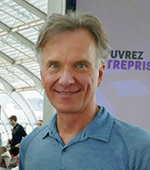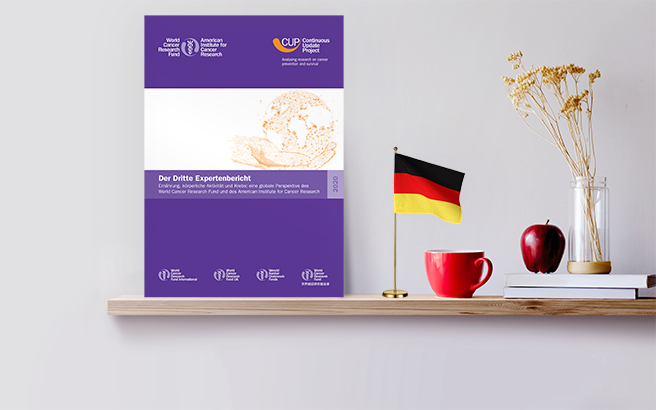 Michael Leitzmann is a Professor of Epidemiology and Preventive Medicine in the Faculty of Medicine at the University of Regensburg, Germany. His research focuses on the link between diet, body weight, physical activity and sedentary behaviour and non-communicable diseases (NCDs), with a focus on cancer. He served as a member of the expert panel on World Cancer Research Fund’s (WCRF) Continuous Update Project (CUP).
Michael Leitzmann is a Professor of Epidemiology and Preventive Medicine in the Faculty of Medicine at the University of Regensburg, Germany. His research focuses on the link between diet, body weight, physical activity and sedentary behaviour and non-communicable diseases (NCDs), with a focus on cancer. He served as a member of the expert panel on World Cancer Research Fund’s (WCRF) Continuous Update Project (CUP).
The German diet
Despite the popular notion that Germany is run predominantly on bratwursts, schnitzels, baked goods and beer, Germans have a long tradition of consuming locally produced healthy foods purchased at farmers’ markets, along with a passion for eating fresh seasonal produce. Also, many Germans today enjoy foreign cuisine, with Italian, Turkish, Greek and Asian restaurants in even the smallest towns. Most recently, there has been a pronounced growth in vegetarianism, particularly among adolescents and young adults, which is helping German cuisine become remarkably innovative.

Existing dietary guidelines in Germany
The German Nutrition Society and the German Cancer Aid recommend engaging in body weight control and physical activity, consuming ample fruit, vegetables and whole grain products, choosing vegetable oils, limiting the consumption of meat, sugar, salt and alcohol, and avoiding processed meat and sugar-sweetened drinks. These guidelines are remarkably similar to WCRF’s Cancer Prevention Recommendations.
The German Nutrition Society and the German Cancer Aid additionally endorse the daily consumption of milk and dairy products, which are good sources of calcium, and they advise eating fish once or twice a week to cover the requirements for omega-3 fatty acids. These recommendations are mainly targeted at the prevention of type 2 diabetes and coronary heart disease, which are also acknowledged by WCRF in its section on the prevention of NCDs other than cancer.
Third Expert Report
The Diet and Cancer Report, also known as the Third Expert Report (TER), represents the most comprehensive analysis of the worldwide body of evidence on cancer prevention and survival through diet, nutrition and physical activity. It was launched in 2018 and extends WCRF’s first and second expert reports, issued in 1997 and 2007 respectively.
The cancer Recommendations, which were updated in line with the TER, are based on results from the CUP, an evidence base of studies and conclusions regarding 17 cancer sites and a multitude of dietary and lifestyle risk factors for cancer. The 2018 Recommendations represent an integrated pattern of behaviours to reduce cancer risk through achieving and maintaining a healthy body weight, increasing physical activity, changing dietary patterns, reducing alcohol consumption, and promoting breastfeeding.
Collectively, these factors represent the major modifiable risk factors for cancer after smoking and they are culturally relevant on a global level, making them accessible to individuals all over the world.
Translation into German
The executive summary of the TER has now been translated into German. This is an important step in preventing cancer because it helps expand the research evidence on cancer prevention and survival to a new audience. The content of the translation will certainly facilitate further international research collaborations, resulting in more knowledge about how diet, nutrition and physical activity impact upon cancer risk and survival.
The TER is a valuable asset to researchers, policymakers, health educators, administrators in health organisations, and anyone involved in cancer prevention. It ensures that the most recent evidence on how to reduce the risk of cancer is available to everyone, including cancer survivors, who are interested in the best ways to further reduce their risk of cancer.
It also highlights areas for future investigation into cancer prevention and survival. With this German translation, a summary of the key findings can now be accessed by many individuals in central and western Europe.
